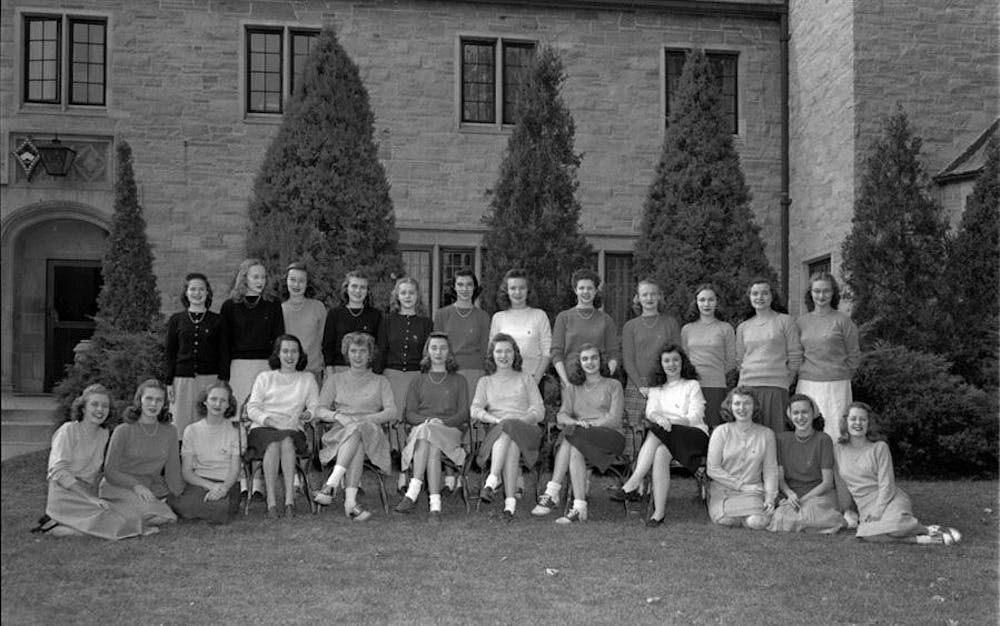Campus is home to 48 greek chapters, but it hasn’t always been this way. The greek community at IU has grown to involve nearly 20 percent of campus.
But it all began with a single house: Beta Theta Pi.
“We came in 1845, which is like six years after the founding of the Alpha chapter,” said Michael Caldwell, a senior and former president of the IU chapter of Beta.
The Alpha chapter of a fraternity is the first chapter founded. The following chapters formed are assigned letters in the greek alphabet that correspond to their order of founding.
Although Beta is now surrounded by other fraternities on campus, Caldwell said being the first fraternity let them leave a mark at IU.
“I do know that because we were the first one on campus, you can see the influence of early Beta on campus,” Caldwell said.
Maxwell and Riley halls, the Rose Well House, McNutt Residence Center and Willkie Residence Center are named after Beta fraternity members, Caldwell said. Kirkwood was also an early Beta member.
“There’s a lot of that,” Caldwell said. “There are eight or nine buildings on campus.”
The first sorority to come to IU was Kappa Alpha Theta, and it’s the second chapter formed of the sorority on a college campus, the Beta chapter.
“Theta was founded in 1870, and our chapter was founded in 1871,” said Kacey McArthur, former president of the Beta chapter. “We were the first women’s fraternity ever in the history of all women’s fraternities. We were there before the word sorority was in place.”
Greek houses go through an extensive process when they’re created, from choosing the values and personalities that house members should exhibit to picking the greek letters the house will use.
The letters for greek houses are not random. Each house stands for different ideals or moral codes.
“Every house people are in, they’re in that house for a reason, for the values that particular house holds,” McArthur said.
Founders selected each letter for a greek house.
“Our founders’ chose our letters for what they mean,” McArthur said. “And so our main thing is like scholarship, and leadership, and the moral code and stuff like that.”
Due to the secretive nature of greek houses, neither Caldwell or McArthur could say what their letters specifically mean.
Caldwell said since Beta was the first fraternity, they played a part in making sure Kappa Alpha Theta was founded on campus.
“We helped establish a lot of sororities on campus,” Caldwell said.
Kappa Alpha Theta has been in the same house next to Collins Living Learning Center on campus since its founding. Beta has switched houses several times, moving from Third Street to one of the informatics buildings to its current location on Jordan Avenue.
Now, these two houses are surrounded by others, and there are so many greek chapters on campus that some of them don’t have physical houses. In the 160 years since Beta’s founding, Caldwell said much has changed within the greek system.
“I know back in the ’50s and ’60s it was a lot tamer socially, but so was everything,” Caldwell said. “I think it’s always kind of reflected the rest of the University.”
McArthur also said much has changed.
“The greek system itself has changed frequently, in my opinion, because it obviously didn’t start with that stigma of partying,” McArthur said.
She described this change further by citing the history of her particular sorority and how its founder overcame the prejudices against women to create a women’s fraternity.
“She gave women the opportunity to become part of something they’re very passionate about,” McArthur said. “Back then, it was about trying to prove to people what you’re made of and what values you hold, that women are just as strong as men and have the right to do that as well.
“Back then it was more of a fight than it is today,” she said. “Back then, I guess it was more of a privilege. It’s still a privilege today, but it’s a lot more common.”
Fraternity, sorority communities at IU have expanded, changed image since 1845 founding

Get stories like this in your inbox
Subscribe





